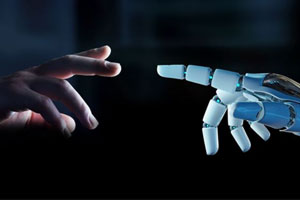 Automation and AI are rapidly spreading through every industry and every workplace. They accelerated during COVID-19, because the need for limiting physical contact forced organisations to find more digital solutions (According to McKinsey, 67% of companies sped up their use of automation and AI due to COVID-19). This trend will continue to grow and expand, even after the pandemic.
Automation and AI are rapidly spreading through every industry and every workplace. They accelerated during COVID-19, because the need for limiting physical contact forced organisations to find more digital solutions (According to McKinsey, 67% of companies sped up their use of automation and AI due to COVID-19). This trend will continue to grow and expand, even after the pandemic.
Of course, this doesn’t mean everything will be automated (and not everything should). We will still value emotional experiences, the personal touch, and human ingenuity. But, even with those personal experiences, there’s a big push to automating everything that creates friction or gets in the way.
For example, we might need to meet (in person or online) to make an important decision. The real value comes from the conversation in the meeting, and that’s where humans excel. But all the other tasks - scheduling the meeting, sending reminders, recording, transcribing, translating, filing and indexing, and distributing actions - can be done through automation and AI.
According to the World Economic Forum’s 2020 ‘Future of Jobs Report’, by 2025, 85 million jobs will be displaced by robotics and automation. But the same report predicts they will also create 97 million new jobs. The catch is they’re not the same jobs!
If you’re a leader, you have an added role as you navigate your team and organisation through this fast-changing world: to help your people adapt, integrate, and embrace the changes AI will bring.
This role requires empathy, care, sensitivity, and yes - more than a smattering of wisdom.
So how do you apply wise leadership in the age of AI?
Let’s start by looking at how you build wisdom. It happens in four stages:
- You start by learning a new skill.
- Through many hours of experience through deliberate practice, you develop mastery in that skill.
- Then, by applying your mastery in different contexts, you learn to exercise good judgement.
- All this experience means you acquire a higher perspective, which leads to wisdom.

Obviously, different people are at different stages, and that can even vary within different roles in their job. If they are at any of the first three stages - skill, mastery, or judgement - you can help them understand the impact of AI and automation on their role.
Skill: AI will replace many skills and some jobs
There’s no doubt some people will lose their jobs because computers and robots will have the same - or better - skills than humans. In the past, this was obvious for manual labour and blue-collar jobs, but it’s increasingly true for higher-level roles as well.
As a wise leader, you will have to help people move out of these jobs. This won’t be an easy task, but if you know it’s likely to happen, act decisively, so your people have as much time as possible to adapt. The worst thing you can do is delay the inevitable.
Mastery: AI will accelerate the experience curve
If mastery requires deliberate practice, AI can help by accelerating the experience curve. For example, it can:
- Provide customised learning paths,
- Assist coaching and mentoring,
- Help people design individual career paths, and
- Help HR and L&D professionals manage your talent requirements.
As a wise leader, identify ways to involve AI in this kind of learning and development for your people. Most people know they will need more learning to adapt to a changing world, and this is an opportunity for you to introduce AI in a positive, non-confrontational way.
Judgement: AI can help people make judgement calls
Much of the negative media around AI has involved it making seemingly arbitrary judgement calls: turning down qualified candidates for senior roles, determining who qualifies for a home loan, showing racial bias in police arrests, and so on.
We’re not yet at the point where we should trust AI to make those judgement calls, but it can help us make those judgement calls. For example, it can analyse large volumes of data quickly, provide relevant information for making informed decisions, and monitor behaviour to determine the results of actions.
As a wise leader, investigate and integrate the power of AI and automation to help your people. This is all about humans and machines being better together than either could be alone. You have probably always done this with technology, but you might not realise just how powerful and affordable AI technology has become.
Will you be a wise leader in the age of AI?
According to research by MIT Sloan Management Review, 85% of leaders believe AI can help them gain a competitive advantage. And Gartner predicts the greatest source of competitive advantage for 30% of organisations will come from leveraging AI and related technologies.
But these raw numbers don’t tell the full story. The real story is not about computers; it’s about people. We have never needed wise leadership as much as we need it now. Will you be one of those wise leaders?